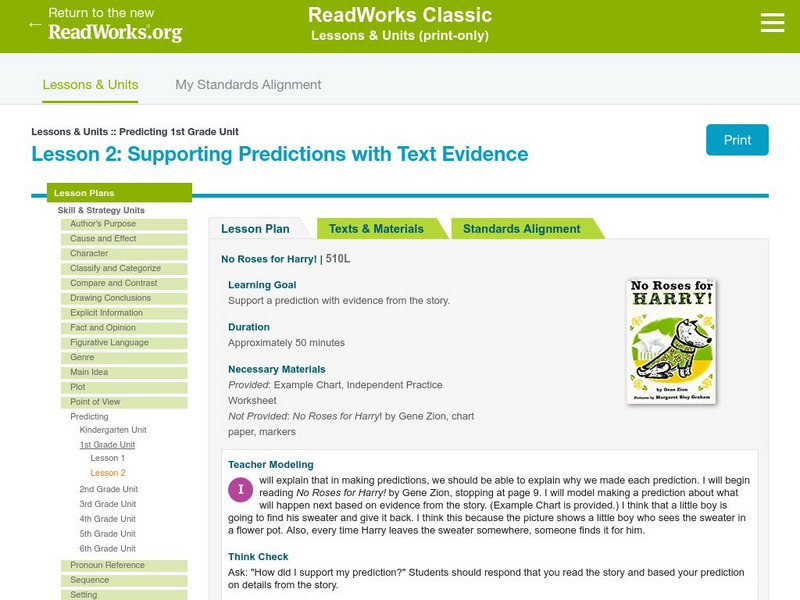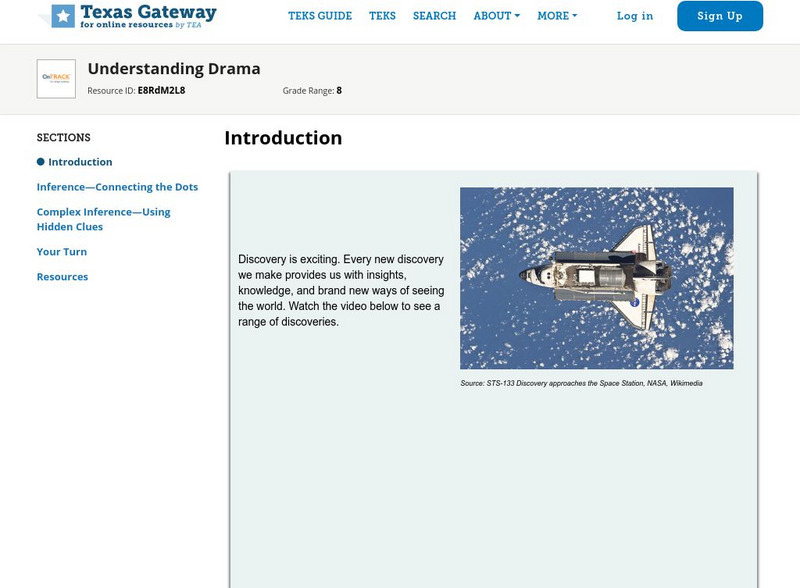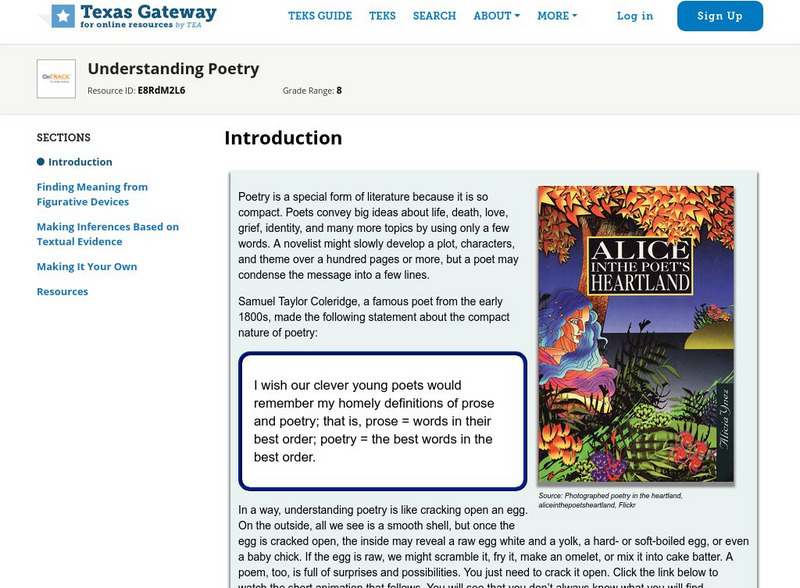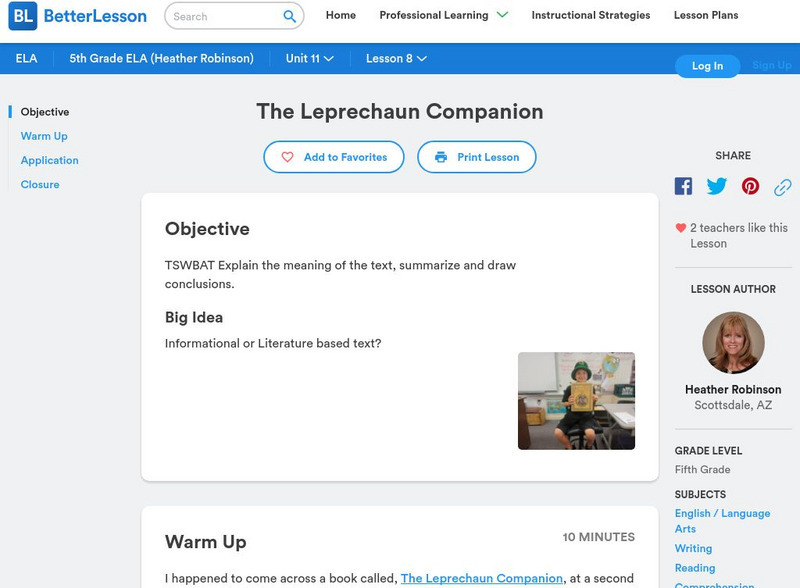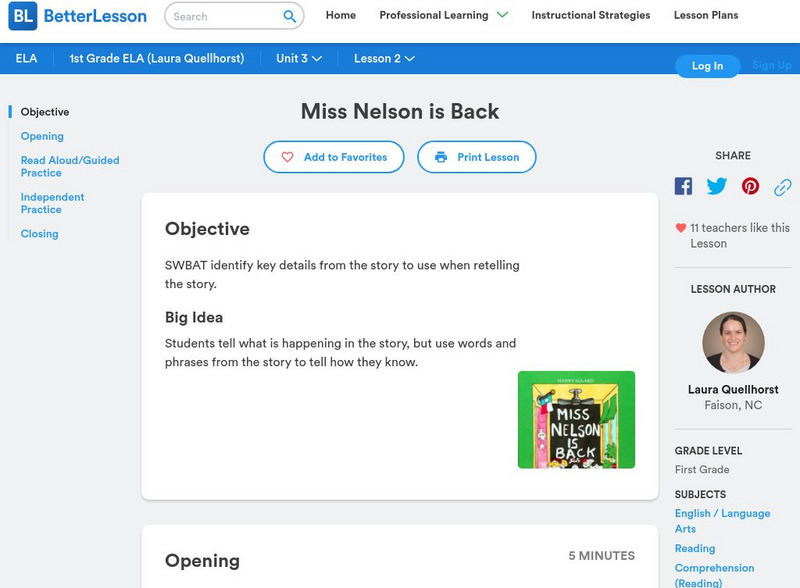University of Maryland
Voices of Democracy: John Fitzgerald Kennedy, "Inaugural Address" January 1961
John F. Kennedy's inaugural speech is one of the most famous speeches in American history. Teachers can use this lesson to teach Language Arts standards, as well as Social Studies standards. This lesson plan includes pre-reading ideas,...
Read Works
Read Works: 1st Grade Unit: Supporting Predictions
[Free Registration/Login Required] A lesson utilizing the book No Roses for Harry! by Gene Zionin in which students make a prediction and then support it with details from the text. Ideas for direct teaching, guided practice, and...
National Endowment for the Humanities
Neh: Edsit Ement: Introducing the Essay: Twain, Douglass and American Non Fiction
This lesson plan serves as an introduction to American literary non-fiction writing and focuses primarily on teaching some basic approaches to recognizing rhetorical strategies adopted for persuasive effect in essays and non-fiction. The...
Read Works
Read Works: Grade 1: Three Lesson Unit: Character: Actions, Feelings, Looks
[Free Registration/Login Required] A series of three lesson plans, based on David Shannon's books No, David!, David Gets in Trouble, and David Goes to School. Students learn how to utilize text and picture clues to determine and describe...
Read Works
Read Works: Drawing Conclusions Kindergarten Unit: Short Story
[Free Registration/Login Required] A lesson plan teaching students to make conclusions based on a sentences and short texts. Students use textual cues to explain how the conclusions were reached. Ideas for direct teaching, guided...
National Endowment for the Humanities
Neh: Edsit Ement:narrative and Persona in the Poetry of Robert Frost
Using Frost's famous poem, "Stopping by the Woods on a Snowy Evening" as an example of narrative poetry, young scholars explore the artistry and significance of the narrative poem. In addition, this lesson plan provides suggestions for...
PBS
Pbs: Multiple Methods of Reading Instruction
This article surveys three strategies to incorporate into classroom repertoire. They include guided reading, choral reading, and readers' theater.
ClassFlow
Class Flow: Salem Witchcraft Hysteria
[Free Registration/Login Required] This flipchart is an inferencing lesson to introduce the Salem Witch Trials used for teaching The Crucible. Students are presumed to already have background on the Puritans.
PBS
Pbs Teachers: Scientific American: Life's Big Questions: Hands On, Minds On
Make inferences about the structure and function of human hands. Investigate the relationship between hand actions and recorded points of contact by exploring hand grasps of a pencil and a broom handle.
PBS
Pbs Teachers: Scientific American: Deep Crisis: Salmon Counting
In this lesson, students can explore the techniques of census and population counting by inferring numbers of a virtual population illustrated within a rectangular sampling grid, and observing the accuracy of the technique in relation to...
Texas Education Agency
Texas Gateway: Understanding Drama
A learning module that teaches students how to understand drama in four mini lessons: Introduction, Inference-Connecting the Dots, Complex Inference-Using Hidden Clues, and Your Turn.
Smithsonian Institution
Smithsonian Learning Lab: Every Picture Has a Story
Smithsonian Education presents "Every Picture Has a Story". Teachers can download this comprehensive teaching package in which students examine some of the millions of photographs in the Smithsonian. This amazing teaching package comes...
Texas Education Agency
Texas Gateway: Understanding Poetry
A learning module that teaches students how to understand poetry in four mini lessons: Introduction, Finding Meaning from Figurative Devices, Making Inferences Based on Textual Evidence, and Making It Your Own.
Better Lesson
Better Lesson: The Leprechaun Companion
In this lesson, 5th graders will explain the meaning of a text and its genre, summarize it, and draw conclusions. They work with a book called The Leprechaun Companion which is a cross between informational and literary text.
BBC
Bbc Skillswise: Reading and Understanding
Tips on how to check understanding of text for adult learnings.
Better Lesson
Better Lesson: Miss Nelson Is Back
First graders tell what is happening in the story, but use words and phrases from the story to tell how they know.
PBS
Pbs Teachers: Dead Men's Tales: Splatter Spread
Emulate the work of a forensic scientist by observing the relationship between scatter and distance. Assemble a projectile-hurling device called a potato cannon and analyze the spread pattern of paint soaked projectiles.
Polk Brothers Foundation Center for Urban Education at DePaul University
De Paul University: Center for Urban Education: I Like Plants [Pdf]
"I Like Plants" is a one page, realistic fiction, reading passage about a person who loves plants and became a botanist; now she teaches her college students about plants and ecology. It is followed by constructed-response questions...
Polk Brothers Foundation Center for Urban Education at DePaul University
De Paul University: Center for Urban Education: I Like Plants [Pdf]
"I Like Plants" is a one page, realistic fiction, reading passage about a person who loves plants and became a botanist; now she teaches her college students about plants and ecology. It is followed by constructed-response questions...
Broward Education Foundation
Broward Education Foundation: Project Living History [Pdf]
Inquiry research is self-directed and project-based on the grade-level curriculum. Students begin an area of inquiry research becoming a critical historian. Focusing on research writing involves reading and a digital search on Destiny...
Polk Brothers Foundation Center for Urban Education at DePaul University
De Paul University: Center for Urban Education: I Like Plants [Pdf]
"I Like Plants" is a one page, realistic fiction, reading passage about a person who loves plants and became a botanist; now she teaches her college students about plants and ecology. It is followed by constructed-response questions...
Other popular searches
- Teaching Inference Skills
- Teaching Inference Reading
- Teaching Inference Implicit
- Teaching Inference 2nd
- Teaching Inference +Reading

